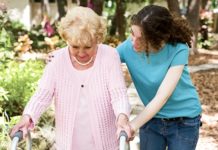
Practical Tips for Caregivers Facing a Pandemic
Whether your role as a caregiver has you looking out for an elderly relative, children or both, chances are good that you’ve worried about how the COVID-19 pandemic may continue to affect your ability to provide necessary care.
Following the most up to date guidelines from the Centers for Disease Control and Prevention is the first step for caregivers who are looking after loved ones. As caregivers continue to adjust during the pandemic, keep these considerations in mind:
- Contact health care providers to obtain extra necessary medications and stock up on over-the-counter drugs.
- Monitor needed medical supplies related to a loved one’s condition or treatments (oxygen, incontinence, dialysis, wound care, etc.) and common supplies such as tissues and cough syrup.
- Those with a loved one in a long-term care facility should inquire about any positive COVID-19 cases in the facility, testing procedures for the residents and staff members and be aware of the facility’s protocol if there is an outbreak or positive tests among residents and staff.
These additional tips can help caregivers reduce the pandemic’s impact:
Make backup plans. Most caregivers have plans in place for temporary assistance when things go awry, but COVID-19 is putting many of those short-term solutions to the test. It’s a good time to pull in additional resources so you have extra help waiting if someone you’re counting on falls ill or can’t fill in as planned. A meal delivery service may be a good option if grocery shopping and meal preparation continue to be affected.
Reduce exposure. Those who take care of loved ones in their homes or are regular care providers to family members and friends have concerns about exposing this vulnerable group to the virus. Many long-term care facilities have changed their visitation policies. You might be able to visit a loved one through a window, via a balcony or through video chat. It’s also important to minimize time spent out in the community where you could unknowingly contract the virus and pass it to a vulnerable loved one.
Shop smart. Because supermarkets and stores with goods identified as “essential” are still bustling with people, it’s important to minimize extra trips and wear a mask when in public. If possible, drop groceries and essentials at the door or arrange for delivery. In addition, some major pharmacies, where AARP members get special benefits on health, wellness and beauty purchases, have introduced special shopping hours for seniors and drive-thru shopping options to minimize person-to-person contact.
Reschedule wellness appointments. Not only are doctor’s offices short on resources, a waiting room can be filled with germs that may cause illness. Try to arrange for telephone or video-based appointments when possible and cancel any appointments that aren’t urgently necessary.
Keep germs away. Thorough handwashing with soap and water is critical. In addition to washing hands after eating and using the restroom, anyone entering and leaving the house should wash his or her hands. Also wipe down high-touch surfaces like doorknobs, remotes and phone keypads.
Combat boredom. Despite the good intentions of staying away, social isolation can be a real concern for seniors. Practicing social distancing is important for their health, but you can help keep them engaged by increasing phone, video and online interaction, and encouraging family and friends to do the same. If your loved one doesn’t already have a cell phone, contract-free plans are available with free activation and special rates for senior users. Many long-term care facilities also offer social distancing activities for residents.
Find more resources for caregivers at aarp.org/save.

Source:
AARP Services, Inc.
















